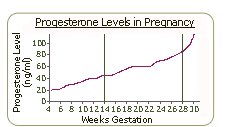34 MENOPAUSE SYMPTOMS |
HEALTH CENTER |
|
| |
|
|
|
Progesterone Plays Role in Postpartum Depression |
A study published in the British Medical Journal has shown that the female steroid hormone progesterone not only plays a vital role in the maintenance of pregnancy, but also in the incipience of postpartum depression.
|
|
|
Progesterone hormones fluctuate dramatically during and after pregnancy, which has led some researchers to suspect that this may be a fundamental part of the severe depression experienced by many women after pregnancy. As many as thirty percent of women experience the so-called "maternity blues" in the days following pregnancy.
|
|
|
The "maternity blues" are a constellation of symptoms experienced in the week (or longer) following delivery, including extreme sadness, insomnia, difficulty concentrating, irritability, headaches, and bouts of tears. Women typically experience the most acute symptoms four to five days after giving birth, which is when hormonal fluctuations are at their most intense. These feelings may develop into more severe and longer-lasting postpartum depression.
|
 |
|
A trial conducted by Harris et al. followed 156 women experiencing their first pregnancy. The researchers tested the subjects' progesterone levels at different points during the pregnancy and after birth, and evaluated their moods according to "the Edinburgh postnatal depression scale, the Stein scale for maternity blues, and the Beck depression rating inventory."
Progesterone levels were checked in the test subjects by taking saliva samples daily in the weeks before delivery, and for the following 40 days. The subjects were also required to fill out a daily questionnaire to evaluate mood after birth for 10 days, and after 40 days they were evaluated by a psychiatrist to assess depression. Blood samples were also taken at four different points in the trial.
In all women, progesterone production increases gradually during pregnancy, when it is mainly being produced by the placenta. By the time of birth, progesterone levels are several hundred times higher than normal. After birth and the shedding of the placenta, progesterone levels fall suddenly and dramatically. |
Most of the women participating in the trial reported at least some of the symptoms of the maternity blues in the week following giving birth. However, the study found that the women most likely to experience the maternal blues were those with the most marked fluctuations in progesterone levels, e.g., the highest levels of progesterone during pregnancy, the most precipitous drop in levels after birth, and continued lower progesterone levels postpartum.
Some medical practitioners have suggested that progesterone may be used to effectively treat postpartum depression.
By Natural-Progesterone-Estrogen-Supplements.com |
 |
|
|
|
|
| |
Copyright� 2008 - - All Rights Reserved |
|
|



